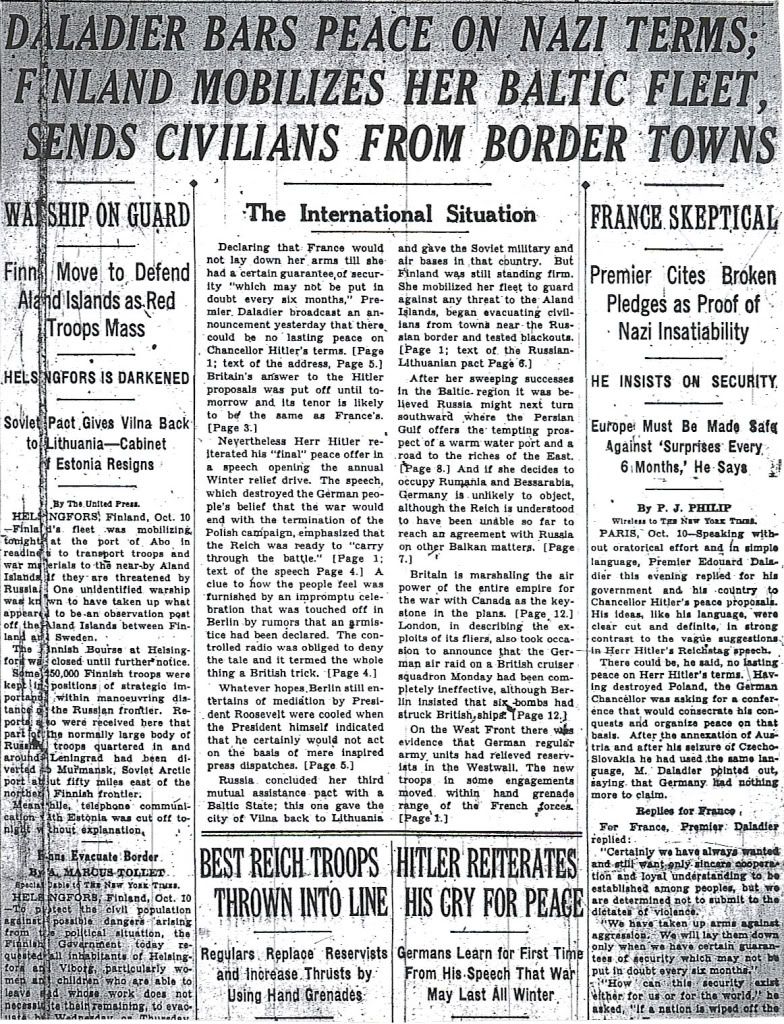
Posted on 10/11/2009 6:12:25 AM PDT by Homer_J_Simpson

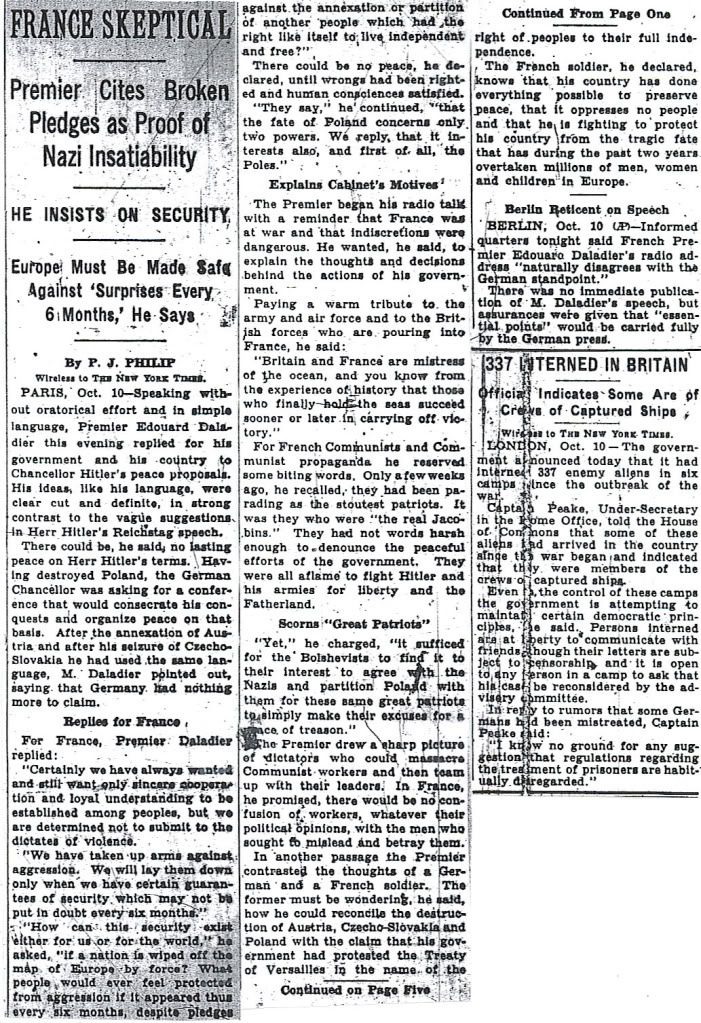
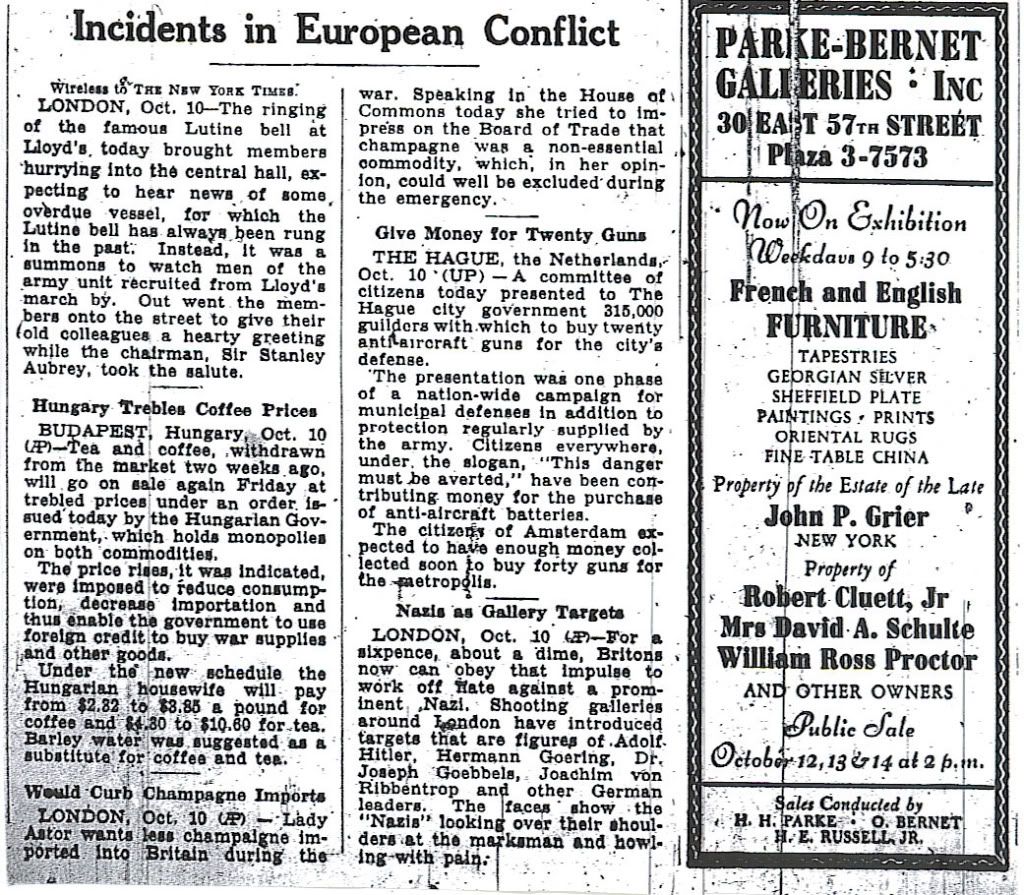
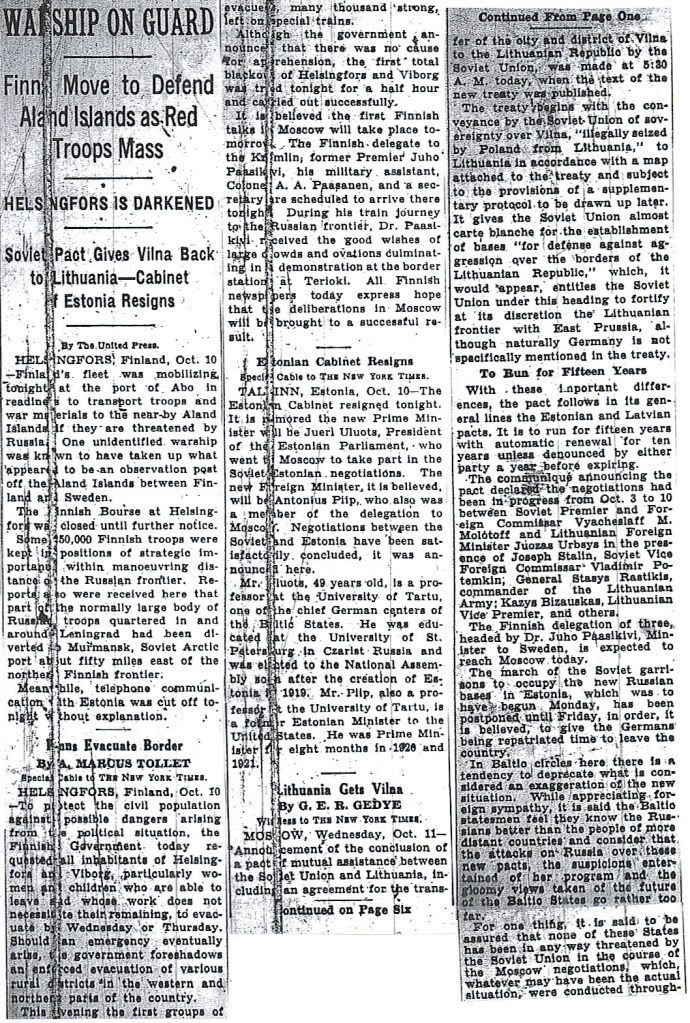
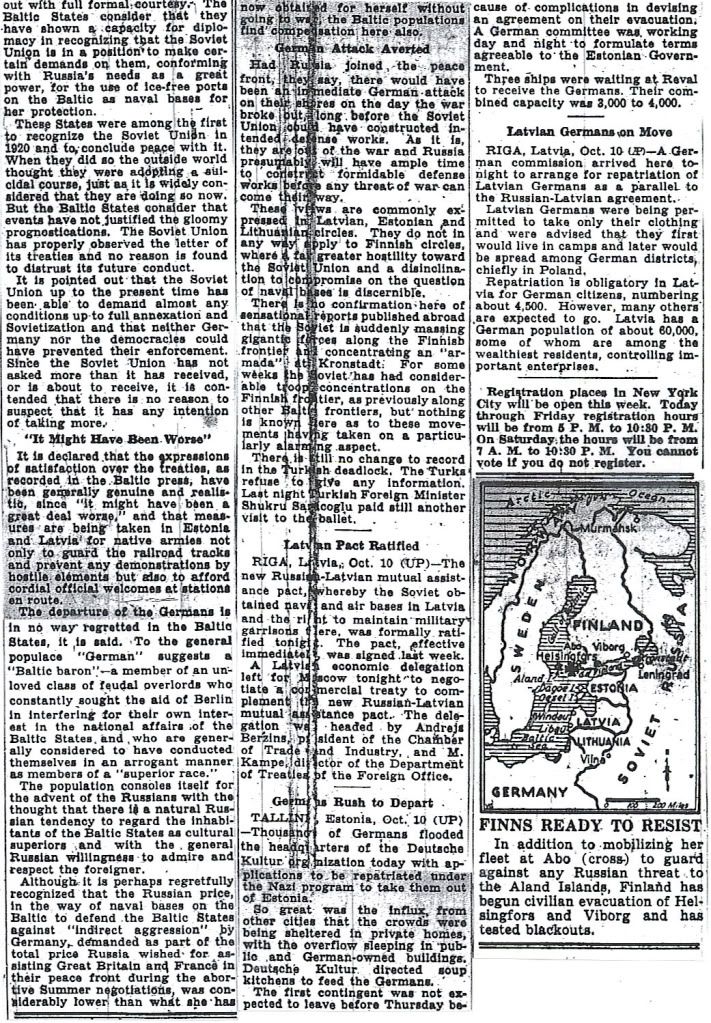
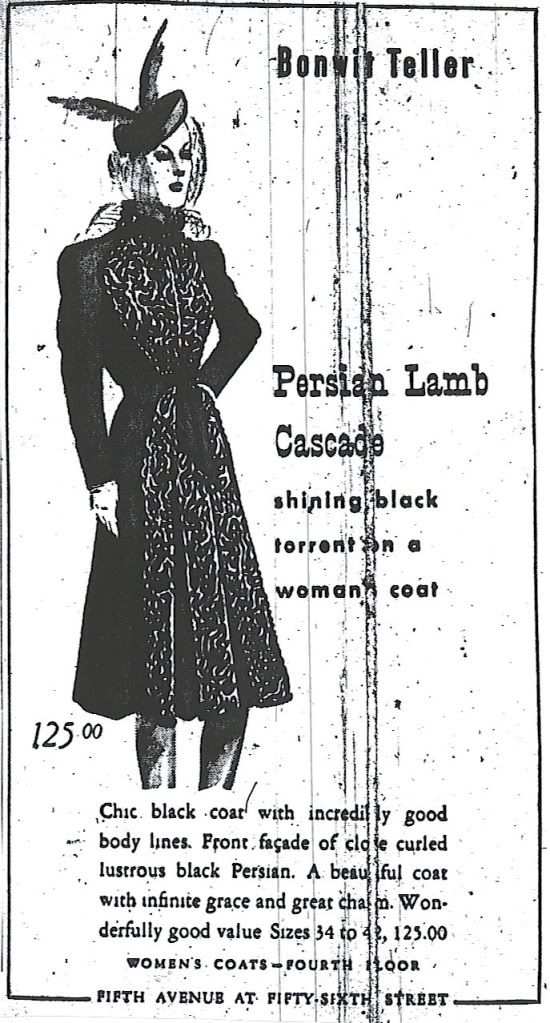
William L. Shirer, The Rise and Fall of the Third Reich
http://www.onwar.com/chrono/1939/oct39/f11oct39.htm
Roosevelt pleads for Soviet restraint
Wednesday, October 11, 1939
From Washington... Fearing war between the USSR and Finland, President Roosevelt appeals to Soviet President Mikhail I Kalinin for restraint and to “make no demands on Finland which are inconsistent with the maintenance and development of amicable and peaceful relations between the two countries, and the independence of each.”
In Finland... In large towns, machineguns and anti-aircraft guns are being mounted.
In the United States... Roosevelt orders American scientists to investigate the feasibility of building an “atomic bomb.”
In Britain... The War Office moves to increase weekly production of mustard gas from 310 to 1200 tons. Britain now has 158,000 troops deployed in France, according to the British Secretary of War, Leslie Hore-Belisha. Meanwhile, in a by-election at Clackmannan and East Stirling, a pacifist candidate draws 1060 votes.
In Germany... A false radio report stating that the British government has fallen and an armistice has been declared leads to open rejoicing.
In London... Polish government-in-exile foreign minister, August Zaleski, consults with the British prime minister and Lord Halifax. Meanwhile, a commercial agreement is signed by the British and Soviet governments by which timber will be imported in exchange for rubber and Cornish tin.
Hitler should have been given the nobel peace prize for his offer of peace. /s
http://en.wikipedia.org/wiki/S-1_Uranium_Committee
World War II began with the German invasion of Poland on September 1, 1939, prompting Albert Einstein and Leó Szilárd to complete the letter to U.S. President Franklin Delano Roosevelt they had been working on over the summer. This Einstein–Szilárd letter was signed by Einstein on August 2, and it was hand-delivered to Roosevelt by the economist Alexander Sachs on October 11, 1939. The letter advised Roosevelt of the existence of the German nuclear energy project and warned that it was likely the Germans were working on an atomic bomb using uranium, and that the U.S. should be concerned about locating sources of uranium and researching nuclear weapon technology. At this time the U.S. policy was neutral in the war.
Stalin showed little reluctance or hesitation in acting on the secret protocol to the Non-Aggression Pact. Here it is a little less than two months since the Pact was signed and he’s already gobbling up the Baltic States and putting the squeeze on the Finns. However, the Finns are a feisty bunch and are not caving in as readily as their Baltic neighbors. Good for them.
As for the poor Hungarian housewife and her expensive coffee, it appears the Hungarian government has the ideal solution; substitute “barley water” instead. Sounds like a good plan to me; I wish Mrs. Henkster would suggest I consume more “barley water.” I take mine fermented and carbonated...
Generalleutnant Günther Rall
Generalleutnant Günther Rall, who has died aged 91, was one of the few outstanding German fighter leaders to survive the Second World War; by the end of the conflict he was the third-highest-scoring fighter ace of all time with 275 aerial victories.
Published: 5:37PM BST 11 Oct 2009
Rall (left) in conversation with Hitler after receiving the Swords to his Knight’s Cross in September 1943
Rall is congratulated on his 250th aerial strike
Photo: Bundesarchiv
In postwar years he was one of the founding fathers of the modern German Air Force and rose to become its chief.
In the spring of 1941 Rall was a squadron commander in Jagdgeschwader (fighter wing) JG-52 flying the Messerschmitt Bf 109 based in Romania. By this time Germany and the Soviet Union were at war and Soviet bombers were attacking the crucial oil refineries. In five days Rall and his men destroyed some 50 Soviet bombers and were next sent to the southern sector of the Eastern Front where Rall’s victories mounted rapidly against the inferior Soviet fighters and bombers.
After shooting down his 36th victim, Rall was attacked by an enemy fighter and his aircraft badly damaged. He just managed to cross the German lines before crash landing in a rock-strewn gully. He was severely wounded and knocked unconscious but German tank crews dragged him clear. He eventually reached a hospital in Vienna where it was found that he had broken his back in three places. Here he was treated by a woman doctor, Hertha, who later became his wife.
When Austria was annexed in 1938 Hertha had helped Jewish friends escape to London, even as Nazi discrimination and anti-Semitic policy made their lives intolerable. Indeed, while Rall was always a devoted soldier in the service of his country, when the facts of the Holocaust were presented to him he came to look on them as “the greatest madness of this insane war”.
“We knew about Dachau, the concentration camps, but not exactly what happened there,” he later explained. “During the war I was hardly in Germany. The airfields were on the front, we had no idea of what was happening behind our backs. When I heard of Auschwitz, I did not believe it. We said clearly: ‘That’s propaganda’.”
Having been paralysed for months Rall returned to operational duty in August 1942. On September 3 he was decorated with the Knight’s Cross of the Iron Cross after his 65th victory. During the following month his score increased beyond 100, bringing him the oak leaves for his Knight’s Cross, the 134th recipient of the coveted award. In November they were presented to him personally by Hitler. Afterwards, as they sat together by the fire, Rall asked Hitler: “Führer, how long will this war take?” Hitler replied: “My dear Rall, I don’t know.” That surprised him. “I thought our leaders knew everything,” Rall recalled, “and suddenly I realised they didn’t know anything.”
In April 1943 Rall was promoted to command III/JG-52. He was constantly in action for the next 11 months. On August 29 he recorded his 200th victory on his 555th operational flight and on September 12 he was again summoned to Berlin when Hitler awarded him the Swords to his Knight’s Cross, the 34th man to be so honoured. Rall returned to operations and in October accounted for another 40 aircraft – more than many of Germany’s best pilots achieved throughout the entire war.
As the war progressed, the obsolete Soviet fighters were steadily replaced by others with far superior performance. Nevertheless, the great majority of Rall’s successes were in fighter-to-fighter combat. During his time on the Eastern Front, Rall came up against many excellent Soviet pilots and was himself shot down seven times. Finally, in April 1944, he returned to Germany.
The son of a merchant, Günther Rall was born on March 10 1918 in Gaggenau in the Black Forest. When he was three, his family moved to Stuttgart where he completed his education at the High School. On graduation in 1936 he joined the Army to be an infantry officer and whilst at the Dresden Kriegsschule met an old friend whose tales of flying convinced him that he should apply to be a pilot.
During the 1930s Rall had viewed the rise of Hitler with no particular enthusiasm but, like many soldiers, approved of the way in which Hitler and the National Socialists had ended decades of humiliation for German-speaking people.
“When Hitler became chancellor,” Rall remembered, “there was no unemployment, no more Rhineland occupation, no more reparations to the victors [of the Great War]. That impressed us as young soldiers, no doubt about it.”
In 1939 Rall trained as a fighter pilot on a base east of Berlin and was transferred to JG-52. Flying a Messerschmitt Bf 109, he saw his first air combat in May 1940 during the Battle of France. On May 18 he shot down a French Air Force Curtis Hawk fighter flown by a Czech sergeant who escaped by parachute. With the fall of France, Rall’s unit moved to Calais.
He flew throughout the Battle of Britain, when his unit was assigned to escort Junkers Ju-87 Stukas (dive bombers), very slow-flying aircraft. The fighters had to stick with them, giving up all of their superiority and speed; the unit suffered heavy losses against the Spitfires and Hurricanes, losing the group commander, the adjutant and all three squadron commanders in a few weeks. Rall soon found himself rapidly promoted to squadron leader before the unit was finally withdrawn in September to rebuild and train new pilots.
Rall was critical of the tactics used which made his valuable and capable aircraft vulnerable to attack by fighters. He always spoke very highly of the RAF. During a postwar interview he said: “In my experience, the RAF pilot was the most aggressive and capable fighter pilot during the Second World War.”
Once the squadron had been brought up to strength, it was transferred to Romania to defend the oil refineries and bridges over the Danube during the spring of 1941. After providing support for the German airborne assault on Crete, Rall’s unit hurried back to Romania following the outbreak of war with the Soviet Union.
After returning from the Eastern Front, Rall was made Gruppenkommadeur of II/JG-11, flying Bf 109s on homeland defence duties, primarily against the high-flying daylight bomber forces and their escorting fighters of the USAAF 8th Air Force. On May 12 1944 he attacked a large formation and shot down two USAAF P-47 Thunderbolts, but was then himself shot down. He was severely wounded in the hand but managed to bail out over Frankfurt. His wound became badly infected and he remained in hospital for six months.
Because he was deemed too precious for the morale of the people, and could not fire his guns because of a missing thumb, he was kept from combat. Rall became an instructor, and studied several American planes that had fallen into the possession of the Luftwaffe to find their strengths and weaknesses and to develop better tactics to teach his students. He flew the P-51 and was amazed at the luxury and quality of the American planes. He once explained that being unable to fly in combat probably saved his life at a time when Germany was totally outnumbered and the chances of staying alive were drastically reduced. But he returned to active duty in November.
Rall’s last command was as the leader of JG-300 and on arrival at the unit’s airfield he was forced to dive into a ditch as USAAF fighters strafed the line up of Bf 109s – 15 were left burning. The Luftwaffe was in retreat and he flew his final operations from Salzburg. During this time he flew the Messerschmitt Me 262 jet fighter but never in combat. He and his inexperienced pilots flew whenever Rall could commandeer fuel. There was no organised air defence system, intelligence on Allied movements was negligible and Rall led his pilots against targets of opportunity.
He flew his 621st and final mission at the end of April. Towards the very last days of the war he asked the men in his command to try to stay alive rather than get involved in senseless actions. He felt it was his responsibility as a leader to try to save the few lives that he could as the war was virtually over and its outcome could not be reversed. A few days later he was captured by the Americans.
Rall flew against all the major Allied fighters and had a high regard for the Spitfire and the Russian Lavochkin 7, which appeared on the scene as he was leaving the Eastern Front, but he always considered the USAAF’s P-51 Mustang to be supreme.
By any standard, Rall’s achievements during the Second World War were outstanding and attracted great admiration from his former adversaries. An American aviation historian of the Smithsonian Institute commented: “He occupies a special niche among the celebrated military pilots of the twentieth century.”
Yet Rall never considered himself a hero. “We fought for our country and to stay alive,” he reflected. “We did not think about the personal nature of killing in the air. We were proud of every victory in the air, and particularly happy that we had not been hit ourselves. Of course, I tell myself in quiet moments today: ‘You’ve killed. In order to protect others and not be killed yourself.’ But in the end: for what? The Third Reich trained 30,000 pilots. Ten thousand survived the war. One-third. This is the highest loss rate along with the U-boat sailors.”
Returning to post-war Germany, Rall was unable to find work. He started a small wood cutting business in the forest and eventually joined Siemens as a representative, leaving in 1953. After meeting a wartime friend and Luftwaffe pilot he joined the new Luftwaffe der Bundeswehr after the re-militarisation of West Germany in 1955. He converted to jet fighters before becoming the project officer for the introduction of the Lockheed F-104 Starfighter, which became the German air force’s main operational fighter until 1980. Among many modifications he insisted upon, which led to the F-104G version, was the replacement of the American ejection seat with the British Martin Baker seat.
Rall became the Chief of Staff of Nato’s 4th Allied Tactical Air Force and after serving as the Inspector General of the Luftwaffe he was appointed the Chief of Air Staff, a post he held for three years. For two years he was the German military representative at Nato headquarters before retiring in 1975.
In retirement Rall established firm friendships with his former British and American adversaries and made many visits to each country. A greatly respected, charming and modest man, he was in regular demand as a lecturer and attended many functions to sign books and aviation art. He was still fulfilling engagements until shortly before his death on October 4.
In 2004 he wrote his memoir, Mein Flugbuch (My Flightbook). He was an honorary fellow of the Society of Experimental Test Pilots.
Gunther Rall’s wife, Hertha, died in 1985. He is survived by their two daughters.
Disclaimer: Opinions posted on Free Republic are those of the individual posters and do not necessarily represent the opinion of Free Republic or its management. All materials posted herein are protected by copyright law and the exemption for fair use of copyrighted works.